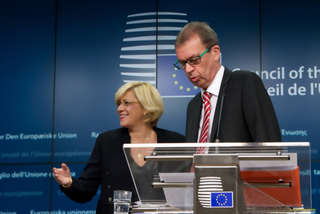On 18 November 2015, Camille Gira, Secretary of State for Sustainable Development chaired the General Affairs Council dedicated to issues related to EU cohesion policy. The Council adopted three sets of conclusions: simplification of the European Structural and Investment Funds (ESIF); 25 years of European Territorial Cooperation (Interreg); and the contribution of the ESIF to the shift towards a low-carbon economy.
Using Interreg to respond to migration-related challenges
 The Council adopted conclusions on the 25th anniversary of Interreg programme, building on the results of an Interreg conference held in Luxembourg in September. Interreg, also known as European Territorial Cooperation, is a financial instrument under the European Regional Development Fund (ERDF) designed to support cooperation between partners across borders.
The Council adopted conclusions on the 25th anniversary of Interreg programme, building on the results of an Interreg conference held in Luxembourg in September. Interreg, also known as European Territorial Cooperation, is a financial instrument under the European Regional Development Fund (ERDF) designed to support cooperation between partners across borders.
The Council agreed on the possibility for Member States to make use of Interreg to respond to challenges due to the migration crisis. The Council considers in its conclusions that Interreg programmes "may support, where necessary and justified, and in complementarity with other appropriate funding streams, to help respond to migration-related challenges within the framework of existing programme priorities and agreed intervention logic".
Given the "major difficulties in relation to the current refugee crisis, the Council considered the possibility for countries, on a voluntary basis, to redefine certain operational programmes so that the funds provided for under Interreg to manage this enormous challenge may be spent in a more targeted way", declared Camille Gira during the press conference following the Council.
"I encourage all the Member States to take a second look at how to use regional development to address current needs and challenges relating to the migration crisis and also to submit programme modifications if necessary", stated Corina Creţu, European Commissioner for Regional Policy. She stressed that many countries only make use of the Asylum, Migration and Integration Fund (AMIF). "We are ready to modify some operational programmes if needed in order to address this important priority which was not present one year ago, when the programmes were designed", she added.
In response to a question asked by a journalist concerning the time limit for using the remaining funds available for 2007-2013, Corina Cretu stated that "there is not much time, as there are only six weeks left". She stated that Italy has already reprogrammed EUR 220 million addressing emergency challenges and that Slovenia and Croatia have also expressed their desire to use part of the remaining allocation for the same purpose.
"Regarding the 2014-2020 period, two countries – Italy and Greece – have already identified targeted measures for migration", she added, specifying that currently no other Member States have made specific requests to use ERDF. She called on the Ministers to look how we can combine the AMIF, the European Social Fund (ESF) and the ERDF to address the challenges relating to refugees and migration.
Agreement on the simplification for the ESIF "at all levels"
The Council adopted conclusions setting out the Member States priorities and expectations for the simplification of the ESIF. By way of a reminder, the Commission set up a high-level group of independent experts in July 2015, chaired by the former Vice-President of the European Commission, Siim Kallas, which met for the first time on 20 October 2015. In the context of the European Commission's "Better Regulation" initiative, the purpose of the group is to reduce the administrative burden on beneficiaries wishing to access the five European structural and investment funds (ESIF).
According to Camille Gira, all the Member States agree on simplification "at all levels" in order to "avoid a situation where the same actors always obtain access to the same programmes". He called for "SMEs and rural areas without the capacity necessary to manage such programmes not to be left by the wayside". He believes that the Council agreed on the fact that the final beneficiaries, such as SMEs or small municipalities, must benefit from the simplification, referring to the "difficulties" that those actors have "in managing a programme like this", with the result that "they never have access to European programmes".
"That money is there for everyone, for all countries, regions, towns and rural areas", he stressed. By way of example, he referred to a beneficiary which was subject to seven audits in order to validate its project, alluding to an "Audit Tower". He called for "problems leading to difficulties and even insurmountable obstacles to be clearly identified at all levels" in respect of SMEs and small municipalities.
Camille Gira also stressed the need to strike a balance between simplification, transparency and verification of the money used. Corina Cretu also highlighted the importance of "striking a balance between simplification and accountability of taxpayers money".
Shift towards a low-carbon economy
In view of the UN climate conference in Paris in December (COP21), the Council adopted conclusions on the contributions from the ESIF 2014-2020 to supporting the shift towards a low-carbon economy. The ESIF for the 2014-2020 period provide substantial funding of EUR 110 billion for climate-related measures in the EU (for mitigation and adaptation), out of which EUR 45 billion for supporting the shift towards a low-carbon economy.

